Elpis: Fallen Star Team Building Guide (F2P & Meta Strategies Explained)
2025-12-02
Building the best team in Elpis: Fallen Star isn’t about luck, it’s about understanding synergy, class roles, and elemental matchups that define the game’s combat system. This Elpis: Fallen Star team building guide will help you create powerful lineups using both meta and free-to-play heroes while mastering team composition and battle flow. Whether you’re optimizing for PvE, PvP, or boss fights, these Elpis: Fallen Star team strategies will help you dominate every challenge.
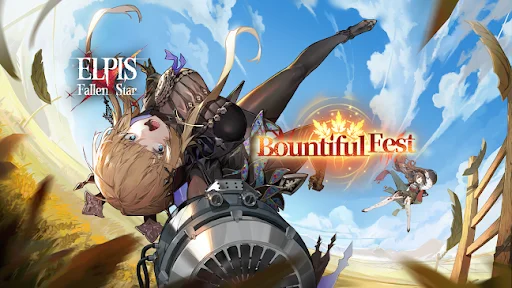
Table of Contents
And if you want to test Elpis: Fallen Star best team setups or automate grinding for materials, OSLink can make things smoother. Run the game on PC, sync multiple accounts for rerolls, and control your sessions remotely, so you can focus on refining your Elpis: Fallen Star combat strategies instead of wasting time switching devices.
Elpis: Fallen Star Team Building Core Mechanics
Before forming the best team in Elpis: Fallen Star, it’s essential to understand how the game’s core systems interact, from class roles and elements to AI behavior and leader skills. Mastering these fundamentals lets you build smarter, faster, and more reliable teams, even with lower-rarity heroes.
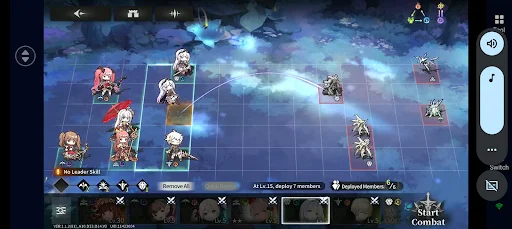
Class Roles
Each hero belongs to one of four main classes, and their placement determines how effectively they perform:
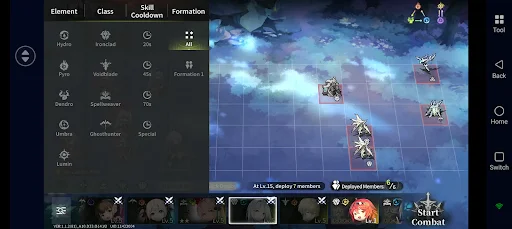
-
Ironclad – Frontline tanks who absorb damage and control enemies.
-
Voidblade – Agile melee attackers focusing on burst damage and debuffs.
-
Spellweaver – Mages and healers who provide AoE damage, buffs, or recovery.
-
Ghosthunter – Long-range physical DPS units with high crit potential.
A balanced setup usually combines 2 Ironclads, 2 Voidblades, 2 Spellweavers, and 2 Ghosthunters, but lineups can shift depending on mode or synergy.
Elpis: Fallen Star Elemental System
Elpis uses a five-element triangle that heavily influences combat outcomes:
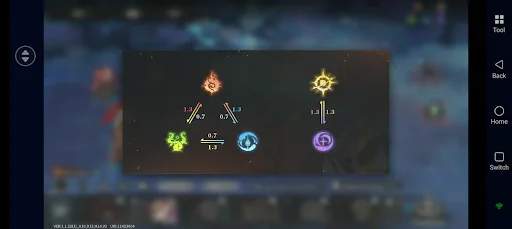
-
🔥 Pyro beats 🌿 Dendro
-
🌿 Dendro beats 💧 Hydro
-
💧 Hydro beats 🔥 Pyro
-
⚫ Umbra and ⚪ Lumin counter each other
Elemental advantage grants roughly 1.3× damage, while disadvantage reduces output to 0.7×, making correct pairing crucial in Elpis: Fallen Star combat strategies. Whenever possible, rotate your roster to match elemental weaknesses.
Leader Skills & AI Order
Only one Leader Skill activates per battle, providing global bonuses such as Attack, Damage Reduction, or Speed boosts. And you should know that skill activation follows AI priority, heroes placed on the left and top rows act first, while those on the right or bottom act later.
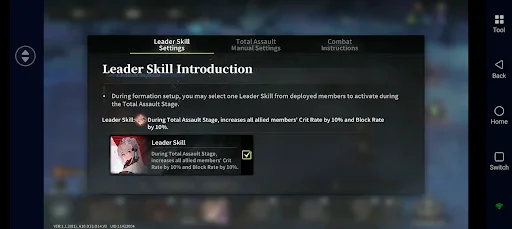
This order affects buff timing, shield application, and combo setups. Strategic placement can decide whether your burst chain lands perfectly or misfires by a second.
Total Assault Mechanics
Once your energy gauge fills, you can manually trigger the Total Assault Phase, allowing all heroes to unleash their strongest abilities. These skills include high-impact effects such as AoE bursts, crowd control, team buffs, or healing.
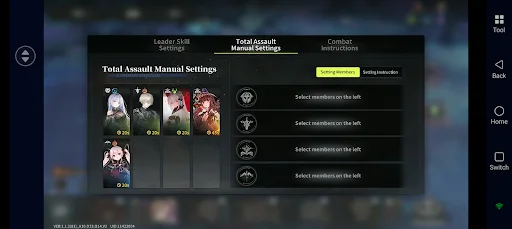
-
20-second cooldowns = Fast activations for frequent use.
-
45-second cooldowns = Heavy hitters for boss burst windows.
Only characters whose cooldown timers have reset can act during the phase, timing your activation is key to maximizing damage and survivability.
Building a Balanced Team
Elpis: Fallen Star team building is less about rarity and more about synergy. Every hero’s class, cooldown timing, and elemental affinity must complement the rest of the squad. The right formation can turn mid-tier characters into end-game assets.
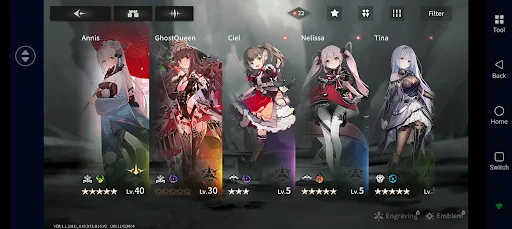
Standard Formations
Different modes call for different team structures, but these three setups provide reliable starting points for F2P players:
1. Balanced Core (2 Ironclad / 2 Voidblade / 2 Spellweaver / 2 Ghosthunter)
The all-purpose lineup for story and exploration.
-
Frontline: Ironclads absorb early burst and crowd control.
-
Backline: Spellweavers handle sustain while Ghosthunters maintain constant DPS.
-
Voidblades: Bridge the two roles with melee burst and debuffs.
2. Offensive Push (1 Ironclad / 3 Voidblade / 2 Spellweaver / 2 Ghosthunter)
Ideal for fast clears and boss melts.
-
Requires careful timing, if your single tank falls, the team collapses.
-
Prioritize damage rotation and elemental advantage to finish fights quickly.
3. Defensive Sustain (3 Ironclad / 1 Voidblade / 2 Spellweaver / 2 Ghosthunter)
Great for early F2P progression or long encounters where your Total Assault timing is crucial.
-
Triple-tank frontline ensures survival while Spellweavers heal or buff.
-
Works best when your damage dealers rely on DoT or counter-based mechanics.
Key Composition Rules
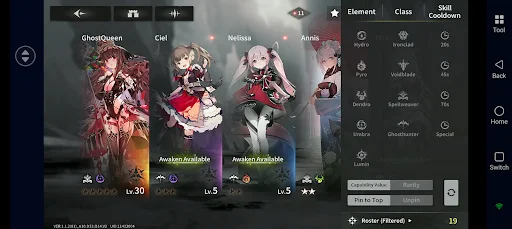
-
Diversify elements: Always include at least three different elements to avoid full-team disadvantage.
-
Balance cooldowns: Mix short-cooldown skills (20 s) with long bursts (45 s) for steady pressure.
-
Synergize buffs: Pair ATK-boosting leaders with crit-based DPS, or DEF-boosting leaders with sustain comps.
-
Mind AI order: Place buffers and healers on the left/top slots so their skills trigger before attackers.
Pro Tip: Two well-timed supports often outperform one extra DPS. Keeping your team alive through a long fight usually deals more total damage than chasing glass-cannon setups.
And if a team feels weak, it’s usually not the characters, it’s the composition or placement. Small tactical fixes often outperform massive power upgrades.
Use OSLink’s Multi-Instance Manager to reroll faster. It lets you clone multiple sessions, run tutorials simultaneously, and sync your summons, helping you secure your dream start in a fraction of the time.

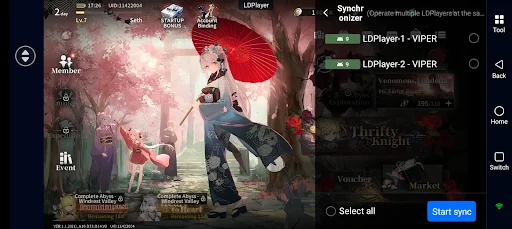
Best Free-to-Play Team Examples (by Archetype)
Building the best team in Elpis: Fallen Star isn’t about pulling the rarest characters — it’s about understanding synergy between class roles, cooldowns, and elements. Below are optimized team archetypes that perform reliably across Story, PvP, and Challenge modes. Each setup includes both F2P-friendly and premium (meta) options for every type of player.
Balanced Team (All-Round Setup)
The goal is to create a stable lineup that performs consistently in all content with balanced damage, sustain, and defense.
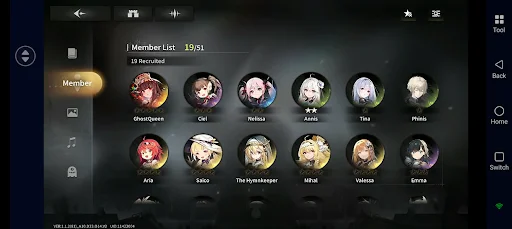
Recommended Formation: 2 × Ironclad | 2 × Voidblade | 2 × Spellweaver | 2 × Ghosthunter
Example F2P Team
-
Frontline: Kasha (Dendro Ironclad) + Sigrid (Dendro Ironclad)
-
Midline: Gima (Dendro Voidblade) + Haidee (Radiant Voidblade)
-
Backline: Annis (Dendro Spellweaver) + Tina (Hydro Ironclad) + Ciel (Dark Ghosthunter) + Nelissa (Pyro Ghosthunter)
Why It Works
-
Kasha + Sigrid form a dual-tank wall with sustain and crowd control.
-
Gima provides stacking Dendro DoT and Attack Speed scaling for consistent DPS.
-
Haidee applies teamwide Defense debuffs to enhance total damage.
-
Annis + Tina give steady healing + team buffs.
-
Ciel + Nelissa deliver safe backline damage with Crit and DoT synergy.
Premium Upgrade Path
-
Replace Sigrid → Jessica (Dendro Ironclad) for stronger team support.
-
Replace Gima → Teostra (Pyro Voidblade) for burst-focused frontline DPS.
-
Replace Nelissa → GhostQueen (Umbra Spellweaver) for scaling magic burst.
Pro Tip: Use Brilliant Glow for DPS and Unyielding Soul for tanks — balanced emblem synergy keeps this lineup adaptable across all content.
Burst Damage Team (Fast-Clear Setup)
The purpose of this team is to front-load massive bursts for quick clears and PvP. Focus on fast cooldowns, Crit chains, and strong Leader buff synergy.
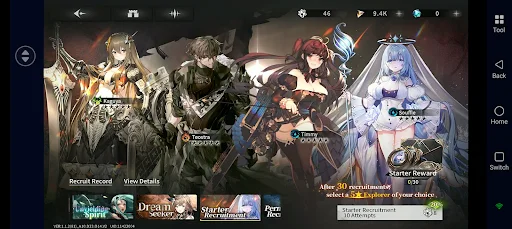
Recommended Formation: 1 × Ironclad | 3 × Voidblade | 2 × Spellweaver | 2 × Ghosthunter
Example F2P Team
-
Frontline: Emily (Dendro Ironclad)
-
Midline: Phinis (Pyro Voidblade) + Lumia (Hydro Voidblade) + Haidee (Radiant Voidblade)
-
Backline: Annis (Dendro Spellweaver) + Tina (Hydro Ironclad) + Ciel (Dark Ghosthunter) + Nelissa (Pyro Ghosthunter)
Why It Works
-
Emily’s Assist and damage sharing keeps the front alive during burst windows.
-
Phinis + Lumia stack DoT effects (Pyro & Hydro) that trigger high-damage Total Assault procs.
-
Haidee ensures consistent Defense reduction for amplified DPS.
-
Annis + Tina sustain the group between cycles.
-
Ciel + Nelissa provide Crit chains and rapid follow-ups after DoT ticks.
Premium Upgrade Path
-
Replace Emily → Teostra (Pyro Voidblade) for better burst mitigation and Leader damage boost.
-
Replace Phinis → Vee (Pyro Spellweaver) for unmatched orb-based AoE detonation.
-
Replace Nelissa → Freya (Pyro Ghosthunter) for Attack Speed and Time Stop synergy.
Pro Tip: Trigger Total Assault when at least two Voidblades and one Ghosthunter have cooldowns ready to maximize burst chains and crit windows.
Sustain & Control Team (Endurance Setup)
With this composition you can build a Elpis: Fallen Star Team that outlast enemies through healing, damage mitigation, and status control. Best for bosses or long PvE fights.
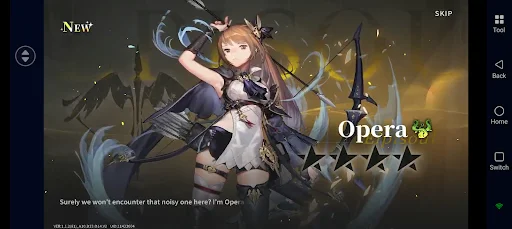
Recommended Formation: 3 × Ironclad | 1 × Voidblade | 2 × Spellweaver | 2 × Ghosthunter
Example F2P Team
-
Frontline: Jasmine (Dendro Ironclad) + Lulu (Pyro Ironclad) + Sigrid (Dendro Ironclad)
-
Midline: Kasha (Dendro Ironclad / Hybrid Tank Damage)
-
Backline: Annis (Dendro Spellweaver) + Saico (Hydro Ironclad) + Ciel (Dark Ghosthunter) + Nelissa (Pyro Ghosthunter)
Why It Works
-
Triple Ironclad core absorbs massive pressure and spreads healing through Annis + Saico.
-
Saico amplifies Healing effect and DEF buffs for frontliners.
-
Kasha adds self-healing and Attack Speed slow for enemy control.
-
Ciel + Nelissa maintain steady ranged pressure and help finish off weakened targets.
Premium Upgrade Path
-
Replace Lulu → Jessica (Dendro Ironclad) for revive protection and AoE heal support.
-
Replace Saico → Arlen (Dendro Spellweaver) for HoT regeneration and teamwide defensive buffs.
-
Replace Nelissa → GhostQueen (Umbra Spellweaver) for superior burst and lifesteal.
Pro Tip: Use Resurging Oath on healers and Terra Blessing on Ironclads to maximize survivability and total healing uptime in extended battles.
Each of these archetypes offers a solid foundation for both F2P and premium rosters. The key is adapting to your available elements and cooldown diversity, synergy always outweighs star count.
Conclusion
By now, you’ve learned how to balance classes, manage elements, and fine-tune formations in Elpis: Fallen Star. Keep refining your setups, test new combinations, and time your Total Assault phases wisely to dominate both PvE and PvP. And if you want to take it further, let OSLink handle the heavy lifting, automate resource grinding, manage multiple teams, and keep your game running 24/7 on PC while you monitor progress from your phone. Download OSLink today and make your team-building journey smarter, smoother, and stronger.

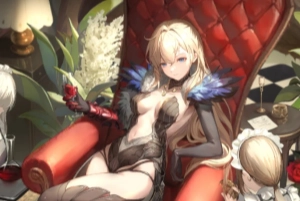
 AFK Anywhere, Progress Anytime
AFK Anywhere, Progress Anytime


